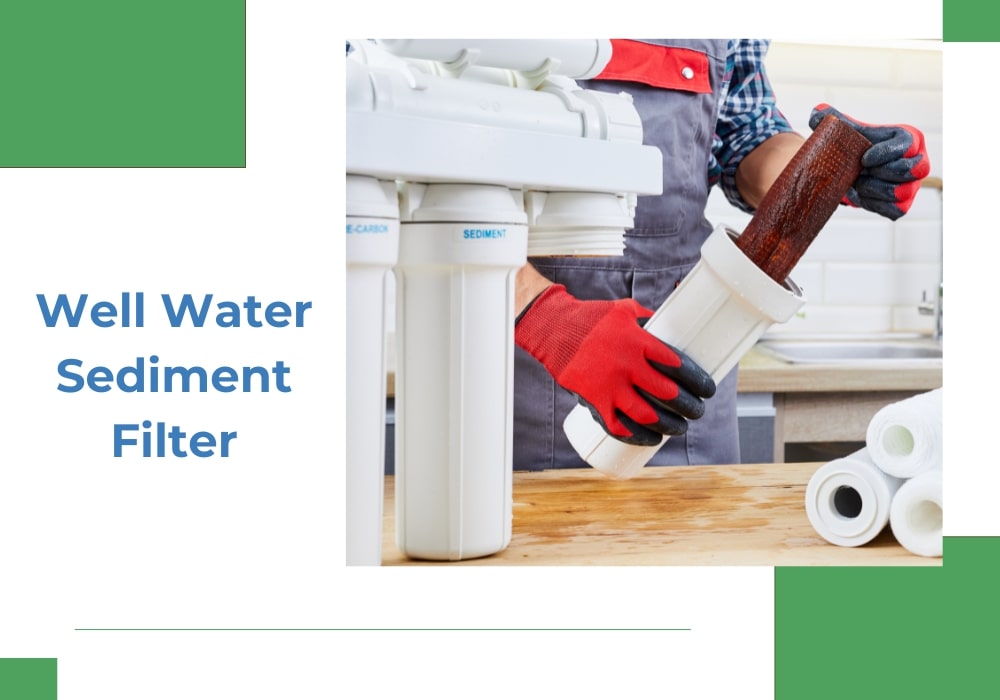Have you ever turned on your tap and noticed murky or cloudy water flowing out? This scenario might be too familiar if you rely on a well for your water supply. It’s not just an aesthetic issue—it could harm your plumbing and health. That’s where a healthy water sediment filter comes into play. In this article, we’ll discuss everything you need to know about sediment filters for healthy water—why they’re essential, how they work, and what to look for when choosing one.
We’ll explain everything step by step so you can make an informed decision about protecting your home and family from the impurities often found in healthy water. From understanding sediment to the benefits of using a filter, you’ll find all the insights you need. Ready to clear up that murky water? Let’s get started!
What Is A Well Water Sediment Filter?
A healthy water sediment filter is crucial for households that rely on wells as their primary water source. It filters to remove particles from your water, such as sand, silt, rust, and other debris. These tiny particles, called sediment, can sneak into your water supply naturally, and if you don’t tackle them, they can cause many problems.
When sediment builds up in your water, it can clog your pipes and cause your appliances to wear out faster.
It can even pose some health risks in your drinking water.
A well-water sediment filter catches these particles before they reach your faucets, ensuring that only clean water flows into your home.
Why Is Sediment A Problem In Well Water?
You might wonder—what’s the big deal with some sediment in your water? Well, here’s why it’s a problem:
- Clogged Plumbing and Appliances: Sediment can accumulate and block pipes, decreasing water flow and pressure.
- Damage to Water Heaters and Filters: Over time, sediment build-up can cause damage to water heaters, reducing their efficiency and lifespan.
- Stains and Unpleasant Taste: Nobody wants discolored water that leaves stains on clothes or has an unpleasant taste.
- Potential Health Risks: While sediment itself isn’t necessarily harmful, it can be a carrier for harmful contaminants like bacteria.
These issues make it clear that installing a well-water sediment filter is more of a necessity than a luxury.
How Does A Sediment Filter For Well Water Work?
The operation of a sediment filter for healthy water is straightforward. The filter acts as a barrier that traps large particles before they can pass through your water system. Here’s how it typically works:
- Filtration Process: Water from the well flows through the filter media, where sediment particles are captured.
- Flow Rate Considerations: The filter’s flow rate maintains water pressure while effectively removing particles.
- Micron Rating: The filter’s micron rating determines the size of particles it can trap.
Some filters also feature multiple stages to target different sediment types, providing more comprehensive protection.
Types Of Sediment Filters For Well Water
There are several types of sediment filters for healthy water, each with pros and cons. Choosing the right one depends on the specific issues in your water and your household’s needs. Here’s a rundown of the most common types:
Spin-Down Filters
These filters are excellent for capturing large particles like sand and gravel. They work by using a centrifugal action to separate sediment from the water. They’re easy to clean and often feature a reusable filter screen.
Cartridge Filters
Cartridge filters are more common and versatile. They come in various micron ratings and are effective at capturing smaller particles. The downside? They need regular replacement, depending on usage and sediment levels.
Backwashing Filters
Backwashing filters are a more heavy-duty option. They’re self-cleaning, meaning you mustn’t frequently replace filter cartridges. These filters are ideal for healthy water with high sediment but require more maintenance and a significant upfront investment.
How To Choose The Right Well Water Sediment Filter For Your Home
Now that you know the types, how do you pick the best healthy water sediment filter for your needs? Some factors to consider:
- Water Test Results: Start by testing healthy water to understand the present sediment types.
- Micron Rating: Depending on the particles found, you’ll need a filter with the appropriate micron rating.
- Flow Rate: Ensure your chosen filter doesn’t compromise your water pressure.
- Maintenance Requirements: Consider how often you will clean or replace the filter.
- Budget: While cost shouldn’t be the only deciding factor, it’s worth considering the initial and ongoing expenses.
Installation And Maintenance Tips
Installing a sediment filter for healthy water can be a DIY project, but hiring a professional is best if you need clarification. Here’s a quick overview of the steps involved:
- Choose the Location: To ensure maximum effectiveness, the filter should be installed as close to the well as possible.
- Shut Off the Water Supply: Before you start, turn off your main water supply.
- Install the Filter: Follow the manufacturer’s instructions carefully. You’ll typically need essential plumbing tools.
- Test the System: Turn the water back on once installed and check for leaks or pressure drops.
The frequency of maintenance depends on the type of filter. Cartridge filters may need replacement every 6–12 months while backwashing filters require periodic cleaning.
Benefits Of Using A Well Water Sediment Filter
Investing in a healthy water sediment filter comes with several advantages:
- Protects Your Plumbing and Appliances: A sediment filter can extend the life of your plumbing system and appliances by trapping debris before it enters your pipes.
- Improves Water Quality: Say goodbye to cloudy water and unpleasant tastes. A sediment filter ensures clean, clear water whenever you turn on the tap.
- Cost Savings: Although there’s an initial investment, preventing damage to your plumbing and appliances saves you money in the long run.
- Peace of Mind: Knowing your water is free from harmful particles brings peace of mind, especially if you’re concerned about your family’s health.
Common Mistakes To Avoid When Using A Sediment Filter For Well Water
While installing a sediment filter for healthy water is beneficial, it’s essential to avoid these common pitfalls:
- Skipping the Water Test: Without testing your water, you might end up with a filter that doesn’t address the specific sediment problems in your well.
- Choosing the Wrong Micron Rating: A too-coarse filter won’t catch smaller particles, while one too-fine can clog easily.
- Ignoring Maintenance: Even the best filter needs upkeep. Neglecting maintenance can reduce water flow and filter efficiency.
- Improper Installation: Incorrect installation can cause leaks or minimize water pressure.
If you rely on healthy water, a well-water sediment filter is necessary to maintain water quality and protect your home’s plumbing system. Remember, the key is to test your water, select the correct micron rating, and keep up with regular maintenance.
Clean, sediment-free water is within reach with the right filter. Don’t wait until you notice murky water—take proactive steps to ensure your family always has access to clean water.
FAQs
How Often Should I Replace My Sediment Filter?
The frequency depends on your filter type and your water’s sediment levels. Cartridge filters usually need replacing every 6-12 months, while backwashing filters require less frequent maintenance.
Can I Install A Sediment Filter Or Hire A Professional?
Many homeowners can install a sediment filter with essential plumbing tools, but hiring a professional is recommended if you’re unsure or unfamiliar with plumbing work.
What Micron Rating Should I Choose For My Sediment Filter?
A 5-micron filter will adequately serve most well-water systems; however, if your water contains very fine sediment, you may need a lower micron rating.
Will A Sediment Filter Remove Harmful Bacteria From My Water?
No, a sediment filter only removes physical particles. If bacteria are a concern, you’ll need a UV filter or other disinfection method.
Say Goodbye To Sediment In Your Water With Pristine Water Softeners!
Are you struggling with cloudy, gritty water that leaves your appliances in bad shape? At Pristine Water Softeners, we’re here to help you eliminate sediment and enjoy crystal-clear water straight from your tap. Our advanced sediment filters are designed specifically for well water, ensuring that every drop is free from debris that can clog pipes, damage appliances, and even impact your health.
Why Choose Pristine Water Softeners For Your Sediment Filter Needs?
- Cleaner Water, Every Time: Get rid of unwanted particles and enjoy fresh and clear water.
- Protect Your Home: Prevent costly repairs and extend the life of your plumbing and appliances.
Ready For Better Water Quality?
Don’t wait until sediment causes severe issues in your home. Contact Pristine Water Softeners today, and let us find the perfect filtration solution for your healthy water. With our expertise, you’ll enjoy pure, sediment-free water that’s safe, clean, and refreshing daily.



